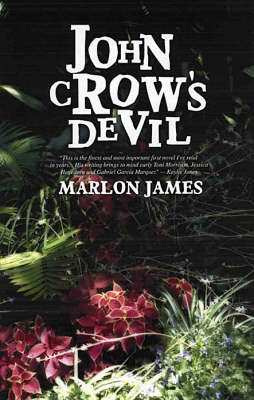Reviewed by brokentune on
I have been keen for some time to try Marlon James’ book but in all honesty, the subject and length of A History of Seven Killings has always put me off. However, I picked up John Crow’s Devil this summer and it may not have been a bad choice as other readers seem to say that James’ first novel suffers by comparison to his Booker Prize winner. It sounded like a great opportunity to use the book for the bingo prompts.
There is witchcraft and magical realism. There are crimes in this book. There are unexplained deaths. And people being horrible. There is a preacher who for most of the book I was not convinced was human. And a whole lot of terror, that is very insidious.
“We’re afraid.
“We’re upset.
“We’re distraught. Even more of us are confused and just about everybody is ashamed. Be truthful before the Lord, you, we are all ashamed. I know what you’re thinking. Thou shalt not kill, I know. That night is playing over and over in your head like that Devil music they keep sending over from foreign. But, beloved, I’m only going to say this once.
“WAKE UP! What do you think this is? Pin the tail on the donkey, church? This is war! “High time some of you in here get off your blessed assurance. God didn’t come here to heal the sick, He came with a sword! We’re tearing down the kingdom of Satan! We launching D-Day on the shores of Hell. We’re going into the enemy’s and taking back what he stole. Oh Abba babba a maka desh—I wish I had a God-fearing church. The Devil is not your boyfriend. Satan is not some naked red boy with a tail and a pitchfork! The Bible says he comes to steal, kill, and destroy! Is either him or us! So what’s it going to be, Gibbeah, him or us? The Devil or the saved? But the Lord says, thou shalt not kill.
“Well, church, what if I tell you that was no man that you killed?”
The last few chapters of the book were truly horrific, especially so because the events of the book are partly based on reality (tho not on specific real events) and partly based on things that could very well happen. It was a horror story of the worst kind because the reader knows that this in not entirely fictional. It was simply chilling.
I will not review this in detail or give away much of the plot because this is a book that is best read without knowing anything about it.
What I do want to say, however, is that James' writing was fantastic. The patois was difficult at first but after a while I got into the rhythm of reading the dialogues and it just added to the atmosphere.
Reading updates
- Started reading
- 6 September, 2020: Finished reading
- 6 September, 2020: Reviewed
